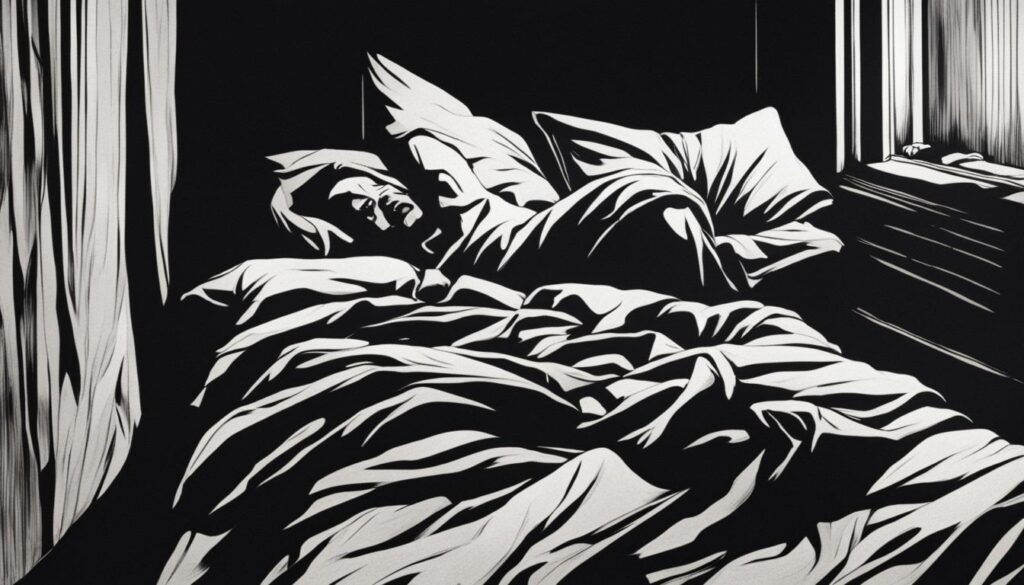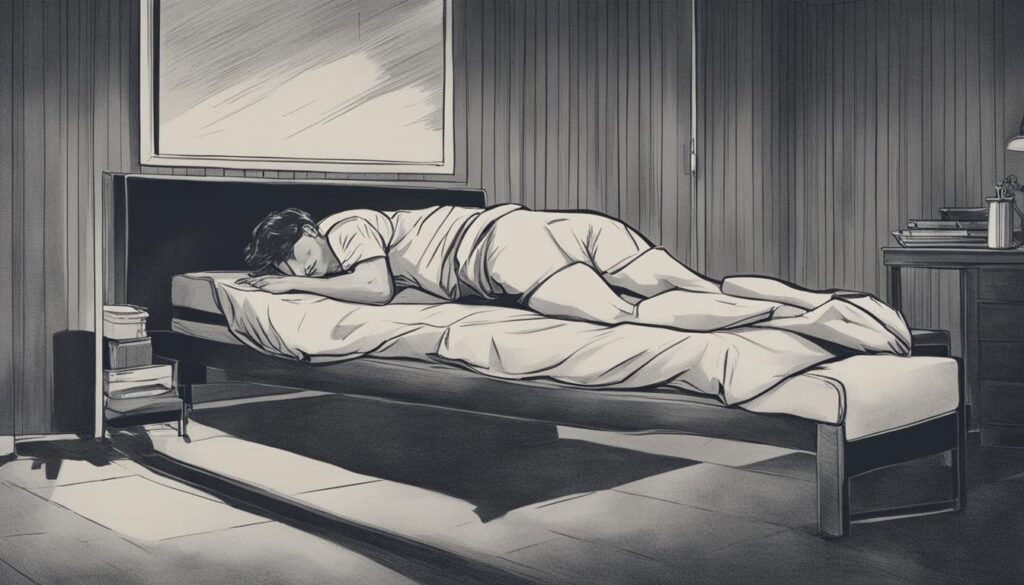As an individual who values my sleep, I have always wondered about the relationship between sleep and various physical discomforts. Recently, I came across an intriguing question: Can a lack of sleep actually cause leg cramps? This led me down a rabbit hole of research, and I discovered some fascinating insights.
Studies have found a strong connection between sleep deprivation and an increased risk of experiencing leg cramps. Lack of sleep not only affects our overall well-being, but it can also contribute to widespread pain, including muscle and joint pain. It decreases our pain tolerance, intensifies pain sensations, and raises the likelihood of developing chronic conditions.
The exact mechanisms underlying this link between sleep and leg cramps are not fully understood. However, it is believed that changes in the nervous system and inflammation in the body play a role. Lack of sleep can also impair athletic performance and delay the healing processes.
If you have experienced muscle pain while sleeping, it might be caused by various factors such as poor sleeping positions, unsupportive mattresses, muscle or joint injuries, chronic conditions like arthritis, overtraining for sports, poor posture, or muscle weaknesses and imbalances.
It is always wise to seek advice from a healthcare professional, such as a physiotherapist, who can provide personalized guidance to alleviate muscle pain and improve sleep quality.
Key Takeaways:
- Sleep deprivation is strongly linked to an increased risk of leg cramps.
- Poor sleep quality can intensify pain sensations and raise the likelihood of developing chronic conditions.
- Changes in the nervous system and inflammation may play a role in the relationship between sleep and leg cramps.
- Muscle pain when sleeping can be caused by factors like poor sleeping positions, unsupportive mattresses, and underlying health conditions.
- Consulting a healthcare professional can provide personalized advice to alleviate muscle pain and improve sleep quality.
The Link Between Sleep Deprivation and Pain
Studies have consistently shown a strong link between sleep deprivation and various types of pain. Lack of sleep not only affects muscle and joint pain but also contributes to the development of chronic pain conditions. Poor sleep quality is associated with decreased pain tolerance, increased pain intensity, and a higher likelihood of experiencing painful chronic conditions.
Chronic back pain is often correlated with unhealthy sleep patterns. Research has found that individuals suffering from chronic back pain and muscle aches frequently experience disrupted sleep and non-refreshing sleep.
Sleep problems have also been found to increase the risk of developing fibromyalgia, a chronic condition characterized by widespread pain. The exact mechanisms underlying the link between sleep deprivation and pain are not fully understood, but changes in the nervous system and inflammation are believed to play a role.
“Non-refreshing sleep has been identified as the strongest factor associated with the development of pain unrelated to specific sources.”
It is crucial to recognize the impact of sleep on pain tolerance and intensity. By addressing sleep deficiencies, individuals can potentially reduce the risk of chronic pain conditions and improve overall well-being.
Next, we will explore the causes of muscle pain when sleeping and provide tips for relieving sleep-related muscle discomfort.

### Example of a table:
| Poor Sleep | Impact on Pain |
|---|---|
| Sleep Deprivation | Decreases pain tolerance |
| Low-quality Sleep | Increases pain intensity |
| Chronic Conditions | Can be worsened by sleep deficiency |
Causes of Muscle Pain When Sleeping
Muscle pain when sleeping can be caused by various factors that contribute to discomfort and disrupted sleep. Understanding the root causes of this condition is essential for finding effective solutions and improving sleep quality. Some of the main causes of muscle pain when sleeping include:
Muscle and Joint Injuries
Injuries to the muscles or joints can lead to pain, both during physical activity and at rest. When you sleep, your body enters a state of relaxation, which can increase sensitivity to any existing injuries. This heightened sensitivity can manifest as muscle pain during sleep.
Chronic Conditions and Muscle Pain
Individuals with chronic conditions like arthritis may experience muscle pain when sleeping. The inflammation and joint stiffness associated with these conditions can worsen during rest, leading to discomfort and disruption to sleep.
Overtraining and Muscle Pain
Engaging in excessive physical activity, especially without proper rest and recovery, can cause muscle overuse and strain. Overtraining can result in muscle pain, which may be felt more intensely during sleep when the body is at rest.
Poor Posture and Muscle Pain
Maintaining poor posture throughout the day, especially in non-ergonomic working environments, can contribute to muscle imbalances and strain. This can lead to muscle pain and discomfort, which may continue to be felt during sleep.
Muscle Weaknesses and Imbalances
Weak or imbalanced muscles can also contribute to muscle pain when sleeping. When certain muscles are weak or not functioning optimally, it can put additional strain on other muscles, causing pain and discomfort during rest.
It’s important to differentiate between normal stiffness after physical activity and persistent muscle pain. If the pain worsens or does not improve over time, seeking advice from a healthcare professional, such as a doctor or physiotherapist, is recommended. They can help identify and address the underlying causes of muscle pain, facilitating improved sleep and reduction of discomfort.

Identifying and addressing the root causes of muscle pain can provide relief, enhance overall sleep quality, and contribute to better overall health and well-being.
Tips for Relieving Muscle Pain While Sleeping
If you wake up with muscle pain when sleeping, there are several steps you can take to alleviate the discomfort. Firstly, it is important to ensure a good sleep environment. A supportive mattress that holds the body properly without causing pressure points is essential for reducing back muscle pain. Consulting a professional, such as a physiotherapist, can provide personalized advice on improving sleep position and reducing strain on the back.
For neck and shoulder muscle pain, choosing a pillow that properly aligns the head and neck is crucial. The right pillow support can help alleviate pressure and tension in the neck and shoulders. It’s important to find a pillow that matches your sleeping position and provides adequate support for your head and neck. Back sleepers may benefit from a flatter pillow, while side sleepers may require a thicker pillow to maintain proper alignment.
Additionally, incorporating morning exercises into your routine can help relieve muscle tension and pain. Stretching your neck and shoulders in the morning can improve flexibility and reduce stiffness. Gentle exercises, such as shoulder rolls and neck rotations, can promote blood circulation and relieve muscle tightness. Remember to start with light movements and gradually increase intensity as tolerated.
Here are some tips to relieve muscle pain while sleeping:
- Invest in a supportive mattress that reduces pressure on the back muscles.
- Consult a professional, such as a physiotherapist, for personalized advice on sleep position and proper body alignment.
- Choose a pillow that matches your sleeping position and provides proper support for the head and neck.
- Perform gentle neck and shoulder stretches in the morning to improve flexibility and reduce muscle stiffness.
Remember, if the muscle pain persists or worsens, it is advisable to seek medical advice from a healthcare professional. They can provide a thorough evaluation and recommend appropriate treatment options to alleviate your symptoms.
| Sleeping Position | Ideal Pillow Support |
|---|---|
| Back Sleeping | A flatter pillow that supports the natural curve of the neck |
| Side Sleeping | A thicker pillow that fills the gap between the ear and shoulder |
Tips for Improving Sleep Quality
Getting a good night’s sleep is crucial for overall health and well-being, especially when it comes to muscle pain relief. Improving sleep quality is essential in promoting rest and recovery, and there are several strategies you can implement:
1. Set a Bedtime Routine
Establishing a consistent bedtime routine can help regulate your sleep patterns. This includes setting a specific bedtime and using an alarm to ensure you get enough sleep each night. By sticking to a routine, your body can adjust to a regular sleep-wake cycle, promoting better sleep quality.
2. Avoid Caffeine in the Afternoon
Caffeine is a stimulant that can interfere with your ability to fall asleep and stay asleep. Limit or avoid caffeinated drinks, especially in the afternoon and evening, to reduce sleep disruptions. Opt for decaffeinated alternatives or herbal teas to promote a good night’s sleep.
3. Engage in a Wind-Down Ritual in the Evening
Creating a wind-down ritual in the evening can signal to your body and mind that it’s time to relax and prepare for sleep. Consider taking a warm bath, drinking a soothing beverage like chamomile tea, or engaging in relaxing activities such as reading or practicing mindfulness. These activities can help promote relaxation and improve sleep quality.
4. Limit Electronic Devices Before Bed
The blue light emitted by electronic devices, such as smartphones and tablets, can interfere with your body’s natural sleep-wake cycle. It is recommended to avoid using electronic devices at least an hour before bedtime. Instead, use that time to engage in calming activities that promote sleep, such as reading a book or practicing gentle stretching.
5. Recognize the Importance of Sleep for Healing Processes
Sleep plays a vital role in the body’s healing processes. It is during sleep that your body repairs and regenerates tissues, releases growth hormones, and strengthens the immune system. By acknowledging the importance of sleep for healing, you may be more motivated to prioritize sleep and allow sufficient time for your body to recover.
Implementing these tips can help improve your sleep quality and, in turn, enhance your overall well-being. By setting a regular bedtime routine, avoiding caffeine in the afternoon, engaging in a wind-down ritual in the evening, limiting electronic device use before bed, and recognizing the importance of sleep for healing processes, you can optimize your sleep and enjoy the benefits of a good night’s sleep.
Conclusion
In conclusion, the relationship between sleep deprivation and leg cramps is undeniable. The lack of sleep not only affects pain tolerance but also increases the intensity of pain, making it more difficult to manage. Additionally, sleep deficiency can contribute to the development of chronic conditions, exacerbating muscle discomfort.
Muscle pain when sleeping can stem from various causes, including injuries, chronic conditions, overtraining, poor posture, and muscle weaknesses. It is crucial to create an optimal sleep environment by investing in a supportive mattress and using a suitable pillow that aligns the head and neck. Incorporating morning exercises and stretching routines can also help alleviate neck and shoulder muscle pain.
To improve sleep quality, establishing a consistent bedtime routine, avoiding caffeine in the afternoon, and engaging in a wind-down ritual in the evening are essential steps. It is equally important to limit the use of electronic devices before bed, as the stimulation can hinder falling asleep. However, if muscle pain persists or worsens, it is highly recommended to seek professional advice from healthcare providers such as physiotherapists or doctors. They can offer personalized guidance and aid in identifying and addressing the underlying causes of muscle pain.
By prioritizing sleep and taking proactive steps to address muscle pain, individuals can significantly enhance their sleep quality and overall muscle health. Remember, seeking professional advice is crucial for persistent muscle pain, as healthcare providers can provide tailored solutions and ensure comprehensive care.
FAQ
Can a lack of sleep cause leg cramps?
Yes, lack of sleep has been found to be strongly linked to an increased risk of experiencing leg cramps. Studies have shown that sleep deprivation and low-quality sleep can lead to the development of widespread pain, including muscle and joint pain.
What is the link between sleep deprivation and pain?
Lack of sleep not only affects muscle and joint pain but also contributes to the development of chronic pain conditions. Research has found that individuals suffering from chronic back pain and muscle aches often have unhealthy sleeping patterns. Non-refreshing sleep has been identified as the strongest factor associated with the development of pain unrelated to specific sources.
What are the causes of muscle pain when sleeping?
Muscle pain when sleeping can be caused by various factors. It may be attributed to muscle or joint injuries, chronic conditions such as arthritis, overtraining for sports, poor posture or non-ergonomic working environments during the day, and muscle weaknesses and imbalances.
What are some tips for relieving muscle pain while sleeping?
To relieve muscle pain while sleeping, it is important to ensure a good sleep environment. A supportive mattress that holds the body properly without causing pressure points is essential for reducing back muscle pain. Consulting a professional, such as a physiotherapist, can provide personalized advice on improving sleep position and reducing strain on the back. For neck and shoulder muscle pain, choosing a pillow that properly aligns the head and neck is crucial. Performing neck stretches and applying heat packs can also help relax muscles and relieve pain.
How can I improve sleep quality?
Improving sleep quality is crucial. Establishing a consistent bedtime routine, including setting a specific bedtime and using an alarm, can help regulate sleep patterns. Limiting or avoiding caffeinated drinks, especially in the afternoon, reduces sleep disruptions. Implementing a wind-down ritual in the evening, such as taking a warm bath, drinking a soothing beverage, and engaging in relaxing activities like reading, can promote relaxation and improve sleep quality. It is recommended to avoid using electronic devices before bed as the stimulation can make it difficult to fall asleep.





